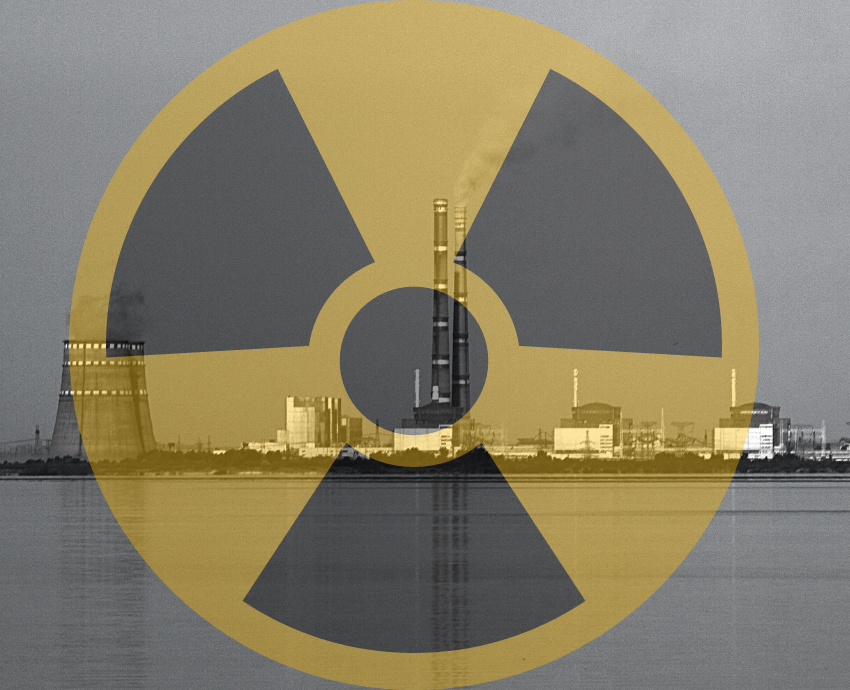
As Russia continues to wage war on Ukraine, there are growing fears that an incident — deliberate or otherwise — could occur at Europe’s largest nuclear power plant.
Located in the Ukrainian town of Enerhodar, the Zaporizhzhia Nuclear Power Plant (ZNPP) has been on the brink of disaster ever since Russian troops occupied it days after the full-scale invasion began in February last year.
Denys Bondar, a Ukrainian physicist specialising in atomic energy, explained to Green Left that since then, “ZNPP workers have been subjected to physical and emotional harassment, as well as forced labour”, adding that “the plant is understaffed”.
This echoes statements by ZNPP workers, who have been raising the alarm for some time over the numerous safety “norms, principles and regulations” that “have been violated” by Russian forces.
Bondar, who is a member of the Ukrainian democratic socialist organisation Social Movement, said, “if engineers cannot safely perform their duties with full access to the facility, the safety of the nuclear power plant cannot be guaranteed.
“Due to the abysmal situation at ZNPP” Bondar added, “an incident (deliberate or accidental) cannot be ruled out”.
Military target
But concerns over ZNPP, along with Ukraine’s other critical infrastructure, have been further heightened in the wake of the June 6 destruction of the Kakhovka dam — which evidence strongly suggests was blown up by Russian forces.
With Ukraine’s counter-offensive slowly advancing, government officials are warning Russia may seek to damage the plant should Ukrainian forces make progress on the Russian-occupied left bank of the Dnipro river.
Russia’s use of ZNPP as a military base to attack nearby territories is already a gross violation of international law. Bondar points out that “United Nations observers have confirmed the presence of mines and military tracks on the territory of the plant.”
But Russia has also used its control of “ZNPP as a part of its nuclear blackmail against Ukraine, alongside constant direct and indirect threats to use nuclear weapons”, a tactic Bondar says “people all over the world should condemn”.
Legacy of Chernobyl
Should a disaster occur at ZNPP, it would not be the first of its kind in Ukraine.
“The Chernobyl nuclear disaster is a traumatic event in Ukrainian history with lingering consequences”, explained Bondar. “It could be argued that it was one of the final straws that broke the Soviet Union.
“Another legacy of the Chernobyl disaster was the desire of the newly independent nation to dismantle the third-largest arsenal of nuclear weapons in the world that Ukraine inherited after gaining independence.
“Hence, another nuclear accident (even a minor one) could reopen deep historic wounds in addition to the trauma of the current Russo-Ukrainian war that started in 2014.”
Moreover, Bondar notes, “given the turbulent state of world affairs, the very last thing the world needs is a nuclear incident”.
Setting precedent
In light of all this, Social Movement activist Taras Bilous, in an article for openDemocracy, noted that the international community has an opportunity to set an important precedent, given this is the first war “to be fought directly in the vicinity of a large nuclear power plant”.
Bilous, who is currently serving in Ukraine’s Territorial Defence Forces, believes the United Nations (UN) should establish ZNPP as a demilitarised zone and deploy peacekeepers there.
This is in line with suggestions from UN secretary general António Guterres and Ukraine’s state nuclear energy company.
While Russia would likely oppose the proposal, Bilous argues a UN General Assembly resolution on the issue “could be a means of pressuring Russia to agree”.
“This would be particularly true if the measure was supported by countries that have so far abstained on or voted against the resolutions regarding the Russian invasion.”
Given the issue of nuclear security should unite all countries — regardless of their positions on the war — Bilous writes, “a country voting against, or abstaining on, this issue would reveal their obvious support for Russia’s nuclear blackmail of Ukraine”.
Such a resolution could also be opposed by the Ukrainian government, who might prefer to attempt to regain control of ZNPP as part of its counteroffensive.
But given the unlikelihood of passing a resolution demanding Russia immediately hand back ZNPP to Ukraine, Bilous writes, “the creation of a demilitarised zone is a much better scenario in terms of nuclear safety” given the ongoing nature of the war.
The Ukraine Socialist Solidarity Campaign (USSC) has initiated an international petition calling on the UN General Assembly to establish a demilitarised zone around ZNPP.
Bondar believes that “if the proposed petition leads to a vote at the UN General Assembly, it will be a major success for grassroots activism.
“We need to exert global social pressure on the UN to become a more effective international body to mitigate numerous crises.”